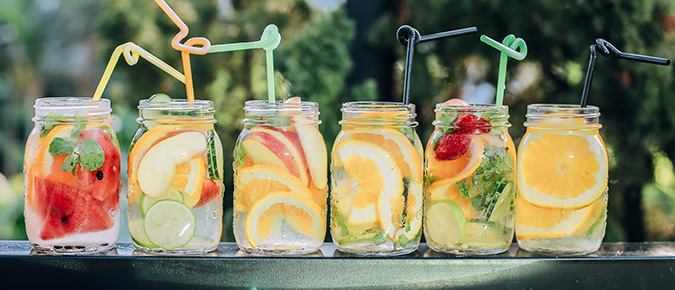
If you are thinking about going Dry this July to help support people living with cancer and are looking for some healthy drink alternatives, this is the guide for you!
We’ve gathered our favourite healthy hydration ideas to inspire you, check them out below!
Water is the best choice
Choose water over drinks with added sugar or alcohol.
In Australia, tap water is safe to drink, quenches your thirst and best of all, is free! Tap water has the added benefit of being fluoridated which helps develop strong bones and teeth.
Plain water not your thing? Mix it up!
Why not add slices of lemon, cucumber, strawberries, or mint to add some flavour and colour. Here’s some more ideas:
- Sparkling water with a squeeze of lemon or lime juice.
- Milk-blended with fresh or frozen fruit for a delicious filling smoothie. Try our berrylicious smoothie or our green smoothie.
- Frappes made with ice and blended frozen fruit make for a nice treat and are also packed with fibre.
- Home-made hot tea without added sugar.
- Home-made hot coffee with reduced fat milk or milk alternatives.
What about fruit juice?
While fruit juice is made from fruit, the juicing process means that most of the fibre is lost. It’s better to eat your fruit whole as it is more satisfying and contains more nutrients and fibre.
If you choose to have fruit juice, have only a small serve (1/2 cup), occasionally and consider diluting with ice or water.
The low-down on sugary drinks
We’re always bombarded with cheap slushie or soft drink promotions, but did you know that one small slushie drink contains 13 teaspoons of sugar and a bottle of cola contains 16 teaspoons of sugar?
Other sugar sweetened drinks include sweetened iced tea, sports drinks, cordial, energy drinks, vitamin waters and fruit drinks and can contain up to 21 teaspoons of sugar in one serve.
We refer to these drinks as having ’empty kilojoules’ because they provide little to no nutrients such as fibre, vitamins and minerals, but are high in kilojoules (calories). These types of drinks can lead to weight gain and can cause tooth decay.
High body weight is a risk factor for 13 types of cancer including cancer of the bowel, kidney, pancreas, oesophagus, endometrium, liver and breast (after menopause).
What about diet drinks?
Although they don’t have the extra kilojoules, they are acidic and can damage your teeth.
Want to know more about how much sugar you could be drinking check out this handy calculator.







